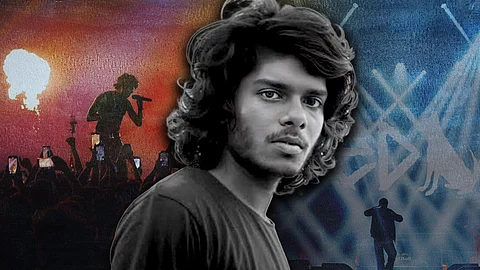

Vedan, who stormed into the Malayalam hip-hop scene five years ago, was granted bail on April 30 in a case that drew public outrage. He was picked up by the Forest Department and charged under the Wildlife Protection Act of 1972 for possessing what appeared to be a leopard tooth. Angry voices rose over the impropriety of the case, and the state action against the Dalit rapper was widely condemned as unjust and casteist.
That this was the second case slapped on him within a week led many to question the intent of the police in "targetting" an anti-caste musician. In the first case, Vedan, along with eight others, was booked for possessing six grams of ganja. While in custody, officers noticed the pendant he was wearing, leading to the second case. He was charged under Section 51 of the Wildlife Protection Act of 1972 for possessing an article allegedly made from a protected animal.
But Vedan’s story is not so easy to unravel, there are layers to peel back to truly understand the debate that has emerged around it. Beyond the questions surrounding the propriety of the cases, what complicates his story are the allegations of sexual abuse that surfaced against him four years ago. TNM speaks to two of the survivors.
Survivors talk
In mid-2021, a few women spoke out about the sexual abuse they faced from him. Debates rose then, like now, with arguments torn between supporting the survivors and considering the caste location of the accused. Vedan issued a public apology in a Facebook post, but the women told TNM that he did not reach out to them personally. Four years later, he still has not, said two of the survivors we spoke to.
They are strongly opposed to the casteist attacks on Vedan now, they said, but could not agree with the claims that he had shown genuine remorse.
One of the survivors, a woman from Other Backward Classes (OBC), said she could not believe Vedan was repentant when he had never apologised to her or the other survivors directly, even after she raised the issue with him. “I ran into him by accident once and told him that none of us could move on without an apology. All I wanted to hear was ‘sorry,’ but he simply walked away,” she said.
What also upset her recently, she said, was learning that he had allegedly continued to be verbally abusive towards women. "I have reason to believe there have been threats to our lives," she said.
Addressing the argument about Vedan's caste location, she said that there was also a Dalit survivor among them. “What about justice for her?”
TNM had spoken to the Dalit survivor in 2021.
“The biggest tool to overcome reality is imagination, and in my imagination, Vedan apologises to me and the other survivors directly,” the survivor said.
Another OBC survivor told TNM that she had not been able to come forward in 2021 when the others did, but she had wanted to speak up for some time. The young woman said she had intended to reveal her story much before the new cases surfaced. “The cause is not only against Savarna casteism but also about standing with women who are oppressed. I was sexually abused [by Vedan] for being outspokenly feminist,” she said.
She added that just because Vedan spoke out against caste, it didn’t mean that he was standing against Brahminical ideologies. “Living in a Brahminical patriarchy, which confines womanhood to merely being a second sex or gender, these kinds of sexual harassment, advances, and manipulations perpetuate the same Savarna ideology. He takes, and has, all male privileges, abusing women and lecturing them about their personal experiences.”
Referring to posts by certain progressive individuals who brought up his public apology, she asked, “Who are they to forgive Vedan? They were not the people he attacked!”
She also addressed the question of the allegations affecting his creative work. “What about our creative work? We can’t even go to spaces where he is present or has an influence,” she said. To get closure, she needs him to admit what he did to her and then apologise for it. A public apology, addressed to no one in particular, will not do, she said.
Reactions
Agreeing with the women, poet Aleena, known for her work on caste and gender, said that gender justice must be anti-caste and Dalit politics should not be patriarchal. “I believe we need a more honest, nuanced conversation around Vedan's case that goes beyond the binary thinking of caste and gender violence. The caste violence he’s experiencing doesn’t cancel out the sexual harassment allegations, and vice versa, because these often reinforce and uphold each other,” she told TNM.
“The same casteist, patriarchal state machinery is against both survivors and Vedan. Because of that, we must hold space for survivor narratives and resist the casteist violence of the state. These are not opposing positions. Rather, confronting both is essential,” Aleena said.
Historian and Dalit activist Malavika Binny, who had spoken against Savarna-centric politics in the attack of Vedan, also expressed solidarity with the survivors. "The support that was given to Vedan in the narcotics case is based on the need to interrogate the double standards of law with regards to oppressor-oppressed castes. Consent violation and consent manipulation are serious issues, they need to be addressed."
She drew parallels with the civil rights movement in the US when Black feminist scholars pointed out the problem of silencing female activists who were sexually abused by prominent male activists in the movement. Progressive people thought that such allegations would slow down the movement. "It is comparatively easier in Kerala's political climate to fight caste than fight gender inequality as men and women across castes benefit from Brahmanical patriarchy. The fight for intersectional gender equality is a tougher fight, but an equally signficant fight and the survivors should not feel alone in this fight."